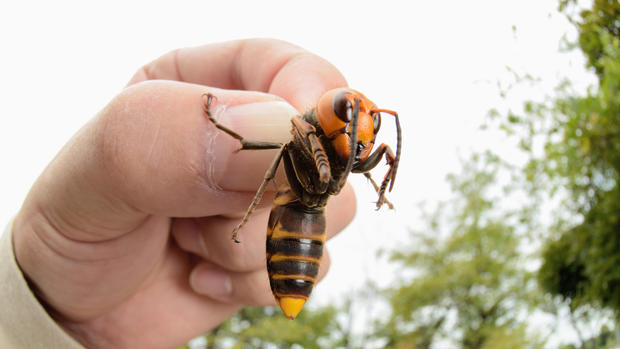Murder hornets cause bees to make fear screams
Asian giant hornets, also known as murder hornets, have spooked some residents over the past year after they invaded Washington state. But a new study shows that it's not just some people who are scared of the two-inch-long stinging insect â€" even bees are screaming and buzzing away when they invade.
The study, published Tuesday in the journal Royal Society Open Science, found that honey bees will buzz, run, and use loud, unique sounds to alert their fellow hive members when murder hornets attack. The sounds they make serve as a distinctive distress signal so other bees can prepare. Along with gathering at the entrance, bees will spread dung around the colony entrances in an effort to repel the hornets.
The researchers documented the bees' behavior in Vietnam, where they have been studying the interactions between the two insects for over seven years. They've collected thousands of signals the bees have made, documented in audio and video recordings like the one seen above.
The so-called "antipredator pipe" happens with good reason, as just a few murder hornets have the ability to completely destroy a hive within hours, decapitating and killing the adults and eating the larvae and pupae in the process.
Invasion! Asian giant hornets have arrived 05:56The noise the bees make when the murder hornets arrive are harsh and irregular, researchers found, similar to that of "shrieks, fear screams and panic calls." When bees engage in the noise, other bees will go toward the hive's entrance and try to defend the colony. The noise is so distinct it gave study author Heather Mattila chills when she heard it.
"The pipes share traits in common with a lot of mammalian alarm signals, so as a mammal hearing them, there's something that is instantly recognizable as communicating danger," she said in a statement. "It feels like a universal experience."
The antipredator pipe witnessed by the researchers happens "almost exclusively" when the bees are attacked by murder hornets, researchers said, noting that they believe the signal includes evolved traits that will get others' attention.
The bees also seem to "string together" their screams, researchers found, similar to "how individual clangs of a bell contribute to a sustained fire alarm."
"Workers are constantly communicating with each other, in both good times and in bad," the study says, "but antipredator signal exchange is particularly important during dire moments when rallying workers for colony defense is imperative."
Mattila said the findings are "exciting," as they provide more information "about the complexity of honey bee communication."
"They share information in a way that shows a remarkable ability to respond to changes in their environment in real time," Mattila said. "In Asia, hornets are the bees' worst enemy, so it makes sense that they have evolved special sounds that reflect the type of predatory threat they face at any given moment."
Murder hornets, which grow to be between 1.5 to 2 inches long and have large yellow-orange heads, were first found in the U.S. in December 2019, when there were four sightings reported in Washington state. Most recently, Washington state agricultural workers found a nest in August.
 "Murder hornets" in America: What you need to know 66 photos
"Murder hornets" in America: What you need to know 66 photos Trending News
Li Cohen
0 Response to "Murder hornets cause bees to make fear screams"
Post a Comment